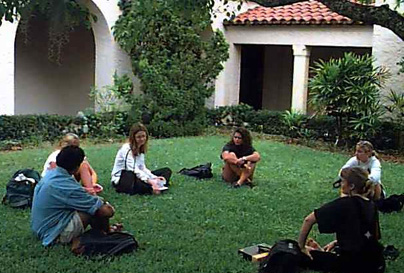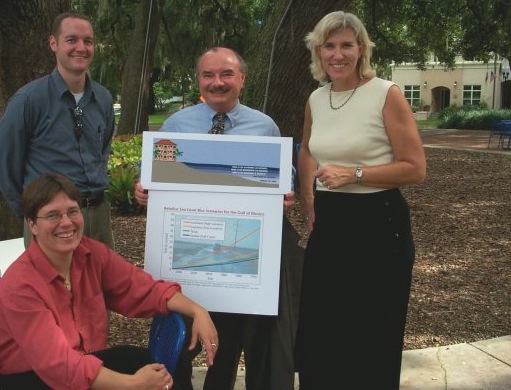Joseph V. Siry, Ph.
D.
Rollins College
Associate Professor
Science and Policy
History of Ecology, Science
and Technology
"In Rousseau’s view (1762). . . most of the problems of education are problems of motivation, as teachers try to rush things. They talk of geography before the child knows the way around his own backyard. They teach history before the child understand anything about adult motivation. . . . It would be far better, to let questions arise naturally. . . . When a child is self-motivated, the teacher cannot keep him from learning."
Attribution
My mission
is to ignite curiosity, stimulate inquiry, and offer  participants guidance and practice in pursuing their thirst for knowing more. In my classes, I want to create opportunities for us to think critically about serious–yet solvable–ecological and
social problems. I hope to entice you to practice "thinking systemically" when attempting to explain, to comprehend and solve complex disputes concerning behavior, beliefs, or policy. We do so by appropriately applying a body of scientific and technical knowledge with human dignity and ecological justice foremost in our decisions.
participants guidance and practice in pursuing their thirst for knowing more. In my classes, I want to create opportunities for us to think critically about serious–yet solvable–ecological and
social problems. I hope to entice you to practice "thinking systemically" when attempting to explain, to comprehend and solve complex disputes concerning behavior, beliefs, or policy. We do so by appropriately applying a body of scientific and technical knowledge with human dignity and ecological justice foremost in our decisions.
By promoting a mood wherein you may exercise thinking for yourself, my desire is for you to know the classical, modern and post-modern discourse from which the current challenges to the accuracy and effectiveness of our scientific knowledge emerged in the last 500 years. I do this so that you may better bear the burden of continuously learning to ensure your ongoing intellectual growth. Therein lies your freedom and your dignity of mind so that you may understand what you enjoy sufficiently well enough to follow your passion.
Consider that we live in an age
when we have more frequent distractions and greater numbers of sources
of information than we know wisely how to handle. All we read, hear, see
and encounter floods us with sensory overload. We are no longer starved for
details about the world. Today we swim in an informative flood of findings.
Indeed we are lost in a confusion of facts and opinions. Deluged
by details most people are unable to determine
important from trivial known facts. Some people are unable to distinguish known
facts from fantasies, or fictions. We are all prone to error and making mistakes. But it is how we correct those errors in all fairness to others and the natural world that makes all the difference between replenishing the earth and undermining people's lives.
Fictions are elaborate stories that assist people in understanding
an otherwise confusing situation. Some specific  legal fictions are created by
well meaning folks to generate certainty. The need for certainty where, too
often, there is only vague feelings, unexamined emotions or prejudices that
shape our "misunderstanding" of everyday events, is understandable. But beliefs based on fictions drawn from unfounded assumptions that give the appearance of certainty without a grounding in reality are dangerous. For that reason, we critically examine widely held beliefs that have no factual basis.
legal fictions are created by
well meaning folks to generate certainty. The need for certainty where, too
often, there is only vague feelings, unexamined emotions or prejudices that
shape our "misunderstanding" of everyday events, is understandable. But beliefs based on fictions drawn from unfounded assumptions that give the appearance of certainty without a grounding in reality are dangerous. For that reason, we critically examine widely held beliefs that have no factual basis.
An overt goal of all my classes is to confront our shared prejudices
and examine our follies in the light of the future's unforeseeable challenges in an art of gentle dialogue. I do interrogate your concepts with respect
for you as a source of individually inherent value. The aim of this dialectical challenge is to allow you to exercise good judgment in distinguishing between trustworthy,
widely accepted facts and erroneous, but commonly held, fictions.
Unless we practice reasoned discourse, respect for the beliefs
of others and an honest commitment to uncover substantiated facts we run a serious risk of
indoctrination. Any set of unexamined ideas that rest on shared fictions has
the potential of leading us toward a fatally flawed, fascistic acceptance of
the "general will."
One purpose of a Liberal Arts education is to
nourish the soul to unshackle the mind to promote our behaving in ways that harm no one. Another intent of a liberal education is, as the Dean of the College at the University of Chicago, Donald Levine has insisted, "the cultivation of human powers." *
* Andrew Delbanco, "Scandals of Higher Education." The New York Review of Books, March 29, 2007,pp. 42-47. Quoted on p. 46.
Rousseau, as quoted in: The Rise and Fall of Childhood, by C. John Sommerville, chap. 12 (rev. 1990).
my motives
Last Updated on August 25, 2007
By Joseph Siry

schedule
| Research home | Atlas
| site-map |
Ecology | laws
| reliable web sites | quick
look
Science
Index | Analysis | Population Index | Global
Warming Index | Nature Index
| Research sites | Genes
Terms
| Glossary
| Word webs
| Basic vocabulary
| Advanced
Vocabulary | Antonyms
| Synonyms
|
Etymology
| Concepts
Writing
| Interviews | Free Writing
Home | Site
Map | Overview

 participants guidance and practice in pursuing their thirst for knowing more. In my classes, I want to create opportunities for us to think critically about serious–yet solvable–ecological and
social problems. I hope to entice you to practice "thinking systemically" when attempting to explain, to comprehend and solve complex disputes concerning behavior, beliefs, or policy. We do so by appropriately applying a body of scientific and technical knowledge with human dignity and ecological justice foremost in our decisions.
participants guidance and practice in pursuing their thirst for knowing more. In my classes, I want to create opportunities for us to think critically about serious–yet solvable–ecological and
social problems. I hope to entice you to practice "thinking systemically" when attempting to explain, to comprehend and solve complex disputes concerning behavior, beliefs, or policy. We do so by appropriately applying a body of scientific and technical knowledge with human dignity and ecological justice foremost in our decisions. 